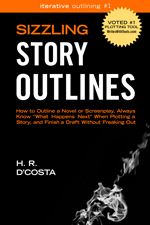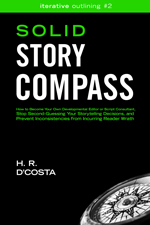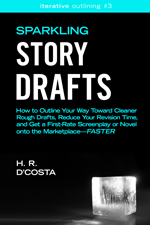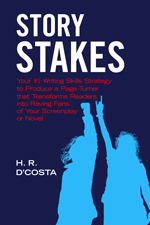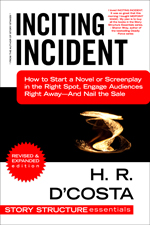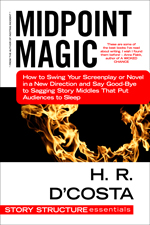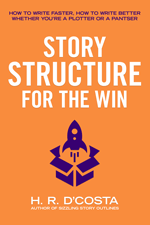Bad boys.
It’s said that, at one point or another, every good girl falls for one.
Something similar happens with writers (whether male or female).
They fall for the literary equivalent of a bad boy: the unlikeable protagonist.
By unlikeable, I’m talking about protagonists who:
- aren’t exactly unlikeable, but nevertheless, aren’t easy to like or feel sorry for (e.g. they’re cool but remote)
- are unlikeable due to their personalities (e.g. they’re disagreeable, deceptive, or cruel)
- whether likeable or not, they engage in unlikeable deeds (e.g. something illegal or morally questionable)
Like bad boys, such protagonists exert their own magnetic allure:
- They’re more fun to write about than likeable protagonists, who can sometimes feel insipid.
- Because the protagonist starts off unlikeable, he has further to grow, and so, generates a deeper character arc.
- Readers can have a more complex relationship with this character—hating him at the beginning, but through your skill, loving him by the end.
- He poses an irresistible challenge that tests your writing mettle.
Let’s talk about that last item for a second. What makes writing a screenplay or novel, featuring an unlikeable protagonist, so difficult?
Readers generally don’t like jerks.
As with real life, they don’t want to spend their time with someone alienating.
Thus, you have to get them to keep turning the pages of your story even when your protagonist is behaving most abominably.
If you’re writing a story with an unlikeable protagonist, your challenge, in a nutshell, is to prevent audiences from walking away before the end, when perhaps, your hero will transform into someone audiences could root for without reservation.
To succeed, try implementing one (or more) of the following tips.
Note: When I use the term hero, that doesn’t mean that the character has to be male or that you’re writing in the action or romance genres. I’m just using it as an alternative to protagonist.
Unlikeable Hero Tip #1: Show his vulnerability
Show audiences that your unlikeable protagonist is vulnerable. Somehow, appearances to the contrary, he can be wounded.
This makes it harder for audiences to disengage from his character.
Why?
If your unlikeable protagonist can be wounded, then at some level—despite his unsavory qualities—he must have the same basic decency as a likeable hero, and so, is worthy of audience empathy.
Melvin, in AS GOOD AS IT GETS, is a perfect example. Mean and obnoxious, Melvin isn’t a likeable guy. But when Frank tells Melvin off, Melvin gets scared…
…which means that sensitivity must lurk behind Melvin’s mean exterior.
Sensing this, audiences are willing to stick around to see what happens to him (a desire that’s reinforced when, shortly thereafter, Melvin is told off yet again—this time by Carol).
Like with most of the techniques in this article, this one can be used to create sympathetic villains as well. Take banker George Warleggan, from Mammoth Screen’s recent adaptation of POLDARK.
At every turn, George seizes the opportunity to sabotage Poldark’s admirable attempts to make Wheal Leisure, Poldark’s copper mine, profitable again, which would not only rebuild Poldark’s fortunes but also benefit the local villagers who need the employment.
If George were just another cold-blooded banker, it’d be easy for audiences to thoroughly despise him. However, they can’t write him off.
Not entirely at least.
That’s due to the first episode in the mini-series, when it’s revealed that George admires Poldark and craves his friendship, which Poldark will never grant.
Thus, greed isn’t the sole motivation driving George’s attempts to thwart Poldark. Stung by Poldark’s rejection, George is lashing out. (Plus, he’s trying to coerce Poldark into friendship.) These are reactions audiences can sympathize with, even though they don’t support George’s schemes.
That’s not all. If George can be hurt by the denial of Poldark’s friendship, then George’s character is salvageable. He’s redeemable.
Over the course of the series, it’s possible for George to transform into a hero whom audiences can root for just as much as they root for Poldark.
Unlikeable Hero Tip #2: Make him forthright about his schemes
Does the following scenario seem familiar?
Character A engages in morally questionable deeds and then tries to hide them from Character B. Discovering the truth, Character B is troubled more by the deception than by the deeds.
You’ve seen this play out in movies and TV shows countless times, right?
I bring it up to emphasize a simple truth: honesty is a mitigating factor.
If your unlikeable protagonist tries to take advantage of another character—but is completely upfront about it—then it’s harder for audiences to judge him harshly for it.
Take the original STAR WARS trilogy. Unlike Luke, Han is no idealistic freedom fighter. He’s in it for the money, honey.
But Han doesn’t try to cloak his mercenary motives, either. Such forthrightness is one reason why many audience members are more interested in Han than in Luke (even though, of the two, Luke is more likeable and sympathetic).
Here’s another example, this time from Tessa Dare’s Regency romance novel, When a Scot Ties the Knot. The hero, Logan, blackmails the heroine into marrying him in order to seize control of her castle and lands. (In this time period, this would be his right, as her husband.)
Certainly not ideal marriage material, is he?
But, despite the hero’s nefarious schemes, audiences don’t want the heroine to go running for the hills. That’s partially because he’s so forthright about his intentions and lack of scruples.
To illustrate, below are a few excerpts of his dialogue:
- “But, I’ll admit—I am entirely without conscience.”
- “I’m after this, lass.” He nodded toward the loch. “The castle. The land. And I’m prepared to do anything to get it.”
- “I’ve made it clear I’ll not stop at lying, blackmail, or thievery. But just in case it needs underscoring…”
- “I never promised you fairness.”
- “I am unashamed to lie, cheat, steal, or blackmail, if that’s what it takes to keep that promise.”
Sure, the hero’s schemes are ugly. Nevertheless, his lack of artifice makes him attractive and appealing.
This is especially critical for a romance with an unlikeable hero who’s unlikeable because he’s working to the detriment of a likeable heroine.
If audiences are completely alienated by the hero, then they won’t care whether he and the heroine get together in the end. At the same time, if the hero were more likeable (in this case, working with the heroine, instead of at cross-purposes with her), then the story’s conflict, tension, and hook would go out the window.
Honesty is one way to reconcile these competing needs (i.e. unlikeability provides conflict, etc., but likeability paves the way for audience investment).
But it’s not the only method at your disposal. In fact, there’s another technique that’s so powerful, it gets audiences emotionally invested in unlikeable heroes even when they are completely duplicitous about their motives.
I’m talking about…
Unlikeable Hero Tip #3: Emphasize the negative consequences of failure (i.e. the stakes)
If audiences know what your protagonist will lose, should he fail to achieve his goal, they might not always root for his success…
…but they’ll stick around to see whether he achieves it or not, especially if they develop an emotional relationship with the stakes.
Going back to When a Scot Ties the Knot, Logan wants to seize control of the heroine’s land through marriage.
If he wanted to own the property solely because that would enable him to hobnob with the upper classes, would romance readers have any interest in his union with the heroine? Would they want to keep on reading?
Barring other circumstances, of course not.
Happily, that’s not the case. An army captain, Logan seeks ownership of the land in order to provide a home base for his men, who’ve lost everything by fighting Napoleon:
They’d fought bravely, survived battle, won the war for England on the promise of coming home to their families and sweethearts—only to find their families, homes, and sweethearts gone. Pushed off the land they’d inhabited for centuries by the same greedy English landlords who’d asked them to fight.
And Logan couldn’t do a damned thing about it. Until today.
Thus, due to the stakes (the fate of the soldiers), audiences remain invested in the hero. They’re eager to see how his marriage to the heroine transforms from an act of thievery into an act of love.
If you want to learn more about harnessing the power of story stakes, read this »
Unlikeable Hero Tip #4: Spend time in his point of view
The more time audiences spend with your protagonist, the more they’ll hear his side of things…and the more they’ll side with him, too.
In Write Screenplays That Sell (a great screenwriting guide, by the way), Hal Ackerman uses WINGED MIGRATION, a documentary about migratory birds, to illustrate the power of point of view (POV):
One [bird] with a broken wing is devoured by the crabs. We feel awful for this bird. But if the documentary were about the crabs, we would have experienced the pain of their lives, the uncertainty of their procreation and birth…and celebrated their finding this meal.
Keep this in mind if you’re writing a story where it’s important to withhold your protagonist’s POV from audiences (as is often the case with a mystery plot or subplot).
For instance, let’s say you’re writing a romance novel where the hero is a criminal, but the heroine falls in love with him anyway. Eventually, it’s revealed that the hero is innocent.
Because this is a big plot twist, you want to delay the reveal for as long as possible, which means you’ll have to limit the scenes told from the hero’s POV. (If you spend a lot of time in his POV, he’s bound to reflect on his innocence, letting the cat out of the bag himself.)
But if you’re not careful, and the crime is serious (e.g. killing his first wife), then audiences can conclude your heroine is an idiot for falling in love with him. Consequently, they won’t be emotionally involved in the plot and in your hero & heroine’s burgeoning relationship.
In this situation, consider dipping into your hero’s POV (and therefore, revealing his innocence) earlier than you intended. As a drawback, this particular mystery will evaporate. On the plus side, audiences are more likely to be invested in the romance.
As an alternative, if you want to sustain the mystery for as long as possible without risking audience alienation, try using technique #3.
If the stakes are high enough (perhaps the hero acted out of self-defense), the heroine doesn’t seem as idiotic for falling in love with him and audiences are more likely to care about the couple’s relationship.
Unlikeable Hero Tip #5: Punish him for doing the right thing
Here, the unlikeable protagonist does the right thing for once (maybe for the first time ever).
However, instead of being rewarded for it, he’s punished.
This injustice entangles audience emotions, getting them invested in the protagonist’s life—even if they’re not feeling particularly “warm and fuzzy” toward the hero.
As evidence, I submit two words:
JERRY MAGUIRE.
After writing and sharing his manifesto, how is Jerry rewarded for embracing his humanity?
He’s not rewarded at all.
Instead, he is fired.
Due to this injustice, audiences care about what happens next. Not necessarily because they like Jerry—he’s shallow and self-centered; he hasn’t yet undergone his character arc—but because they want to know whether (and how) this injustice will be corrected.
Not buying it?
Imagine an alternate version of the story where Jerry writes his manifesto, but isn’t fired for it (he just gets a warning), and his relationship with Dorothy plays out within the office.
That’s not a bad start. The manifesto shows that Jerry’s redeemable and potentially worthy of Dorothy’s heart. But without being punished for his good deed, would audiences be as invested in Jerry’s journey?
My guess is no. What do you think?
To see how CASINO ROYALE (2006) uses the same tactic, check out tip #5 from this article on how to write a gripping spy story »
Unlikeable Hero Tip #6: Punish him for doing the wrong thing
So. Your protagonist is a horrible person.
He has a horrible plan.
In ordinary circumstances, audiences wouldn’t want to spend time with him. Consequently, they wouldn’t want to continue reading your screenplay or novel.
Unless, that is…
…your horrible hero’s horrible plan goes horribly awry.
Delighting in your unlikeable hero’s comeuppance, audiences are less likely to disengage from your story—and more likely to keep reading.
To see how this works, look at the film adaptation of ABOUT A BOY. Like Jerry Maguire, Will is shallow and self-centered. Will even pretends to be a single parent so he can attend a single-parent support group—which, in his mind, is the perfect hunting ground to find single women.
Ick.
Turned off by Will’s slick personality and morally dubious behavior, many audience members would be inclined to walk away from Will.
Yet, they still hang around to see what happens next, partly because Will’s plan goes awry.
Sure, his fictitious son enables him to score a date with an attractive single mother. However, she brings Marcus, the child of another single parent, to tag along with them. And Marcus’s presence ruins the date.
In other words, Will gets punished for his skeevy scheme. This sliver of justice is enough to compensate for the ick factor. It keeps audiences interested in Will’s fate, despite his unlikeability.
It helps, too, that the film (and novel) employ technique #8. But before we get to that, let’s cover…
Unlikeable Hero Tip #7: Give audiences someone worse to hate
Here’s another easy way to get audiences to rally behind your unlikeable protagonist: harness the power of comparison.
Include another character who’s so evil or manipulative that, in contrast, your unlikeable protagonist looks like a Boy Scout.
As a lighthearted example, study 10 THINGS I HATE ABOUT YOU. Patrick doesn’t really like Kat. Not at first. He’s just wooing her to gain some extra cash. Good prom-date material?
I think not.
Even so, Patrick’s just a pawn in Joey Donner’s schemes to achieve world domination (and by world, I mean high school). Of the two, Joey is worse.
By far.
Plus, Kat’s own shrewish behavior indicates that Patrick will get scratched by her “claws.” (This, you’ll note, taps into technique #6.) With all that on Patrick’s plate, audiences can’t really despise him, despite his impure intentions.
This technique is also suitable for more dramatic fare. To return to POLDARK, in the season 1 finale, Poldark suffers a great tragedy. While George’s uncle responds with almost unbelievable callousness, George exhibits compassion toward Poldark’s plight.
Because George does, in this instance, respond the way a decent man would—and because this decency seems even larger in scope when juxtaposed with the callousness of his uncle—it’s a little more difficult to hate George, even though he has engineered several of Poldark’s misfortunes.
As one last example (not involving the hero, but it still works), look at THE SILENCE OF THE LAMBS, which stretches this tactic to the limits.
Hannibal Lecter has a lot of black marks against him. He’s a cannibalistic serial killer. Instead of helping Clarice stop another serial killer, he dawdles with mind games.
It’d be easy to write him off, not care whether he lives or dies.
But.
He himself is victimized by Dr. Chilton, who abuses his power as the head of a state hospital for the criminally insane.
So, when Lecter escapes captivity at the end of the film, it’s hard to begrudge him his freedom—even though he’ll use it to engage in horrific crimes…even though he used horrific means to achieve it.
Unlikeable Hero Tip #8: Pair him with a likeable protagonist
Face it: making audiences invest in an unlikeable hero is an uphill battle.
Lessen your authorial burden by pairing your hero with someone whom audiences can invest in more easily, e.g. someone whom they like or feel sorry for.
Notice that almost all the examples in this article employ this tactic:
- Carol (AS GOOD AS IT GETS)
- Luke (STAR WARS)
- Maddie (When a Scot Ties the Knot)
- Dorothy (JERRY MAGUIRE)
- Marcus (ABOUT A BOY)
- Cameron (10 THINGS I HATE ABOUT YOU)
Bear in mind, to get the most out of this technique:
- The likeable character’s life should be entangled with your unlikeable hero’s in a meaningful way.
- You must spend significant time in your likeable character’s point of view.
* * *
What are your favorite examples of getting audiences to invest in unlikeable protagonists? Share in the comments!
Suzuki SV 650 S (with modifications) by pixelfever
